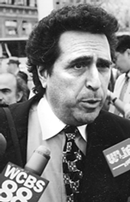LGBT groups discuss their strategies for mobilizing, raising visibility of the issue
Republican Mayor Michael Bloomberg’s successful appeal of the historic February court decision ordering him to allow gay couples to marry in New York was not met with angry protests in the streets, but LGBT groups are gearing up to raise the visibility of the issue once again before the state’s highest court hears the case. Some are trying to enlist the help of Bloomberg himself, their adversary in court who told Gay City News this week that he hopes he loses.
“I’m concerned that not enough political attention is being paid to this issue,” said Doug Robinson, who with his partner Michael Elsasser and four other same-sex couples had their right to marry overturned by the Appellate Court’s 1st Department in a four-to-one vote. “I would like to see all the plaintiffs in the five cases get together and rally around this civil rights issue.”
Mayor John Shields of Nyack, a plaintiff in the only case that has not been heard in the mid-level court, has the same idea. He also hopes that Bloomberg and Democratic Attorney General Spitzer will stop fighting so hard against marriage in court if they are in fact for same-sex marriage.
“I’m asking people to stand up and stop equivocating,” he said. “I’m disappointed that the major groups didn’t have more of a reaction. We need to confront them.”
Matt Foreman, executive director of the National Gay and Lesbian Task Force and a City Human Rights Commissioner, said, “I’m appalled by the language of the decision,” which he called “harsh and judgmental.” He criticized the city’s appeal, too, but noted that the decision sounded as if it came from a court in a Southern state. The court, almost all appointees of Republican Governor George Pataki, agreed with Bloomberg’s Law Department that marriage is primarily for “procreation.”
NGLTF is pouring resources into fights in 2006 against 12 state constitutional amendments against same-sex marriage, most of which would also eliminate domestic partner benefits, especially California, and leaving New York—where there is little threat of an amendment—to fend for itself. Foreman said, “It is time for the Democratic Party in New York to start leading on marriage equality and pass legislation,” particularly in the Democrat-controlled Assembly. The party is on record supporting the right of same-sex couples, but has not acted on that position.
Ron Zacchi, co-chair of Marriage Equality, said that group is planning a town meeting on January 4 to bring together all supporters of same-sex marriage in and out of the LGBT community to strategize for 2006. The group is inviting Bloomberg to participate.
“Now is a time to stand behind the couples fighting these legal battles, our brothers and sisters, and make a statement that we will be silent no longer,” he said.
As Gay City News reports elsewhere in this issue, Bloomberg is looking to call a meeting of his own in January with gay leaders to discuss this and other issues. The mayor has promised to lobby Albany—and testify—on an equal marriage bill, but has put no time or resources into that fight. He spent $7 million of his own money in an unsuccessful campaign to impose non-partisan elections on the city in 2003.
Alan Van Capelle, executive director of the Empire State Pride Agenda, sent out an e-mail saying the group is “not waiting around for these cases to move to the highest court” before “swinging into action.” The letter said ESPA has been working for two years building support, passing incremental legislation protecting gay relationships, stopping anti-gay marriage bills, and expanding a “Pride in the Pulpit” religious support campaign that is up to 500 members. The Pride Agenda is asking supporters to become “Marriage Ambassadors” in their communities by calling Elisabeth Bullard at 212-627-0305 and participating in Equality and Justice Day in Albany in May by talking to legislators about marriage.
Norman Siegel, a veteran civil rights attorney who is co-counsel on the marriage case in which Nyack’s Shields is a plaintiff, said, “It is disappointing that there is not enough real outcry over the 1st Department’s decision,” adding that “we must renew the visibility” of the marriage movement that was so evident in 2004 and early 2005. “History shows that test case litigation often involves public participation regarding the merits of the issue.”
Siegel also said, “History will also demonstrate that both Mayor Bloomberg’s and Attorney General Spitzer’s offices were not forthright in how they handled this. The mayor should not have appealed. That would have allowed New York City to be a place where same-sex couples could have married.” He added, “Spitzer made arguments [in the three appeals heard in Albany] about how the political strength of the gay and lesbian community demonstrated it was not a suspect class. That is a stereotype. Some have achieved political power, but not all or even many have. Homophobia is alive and well.”
Shields said he asked Spitzer at a function last year why he was equivocating about same-sex marriage. “He told me, ‘You’re not going to like my answer, but it will take about ten years for society to change’” and support same-sex couples. The next few months will tell whether gay New Yorkers are unwilling to wait that long.
gaycitynews.com


































